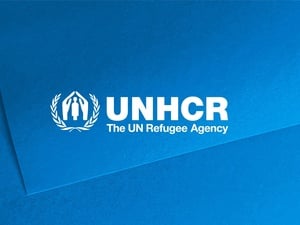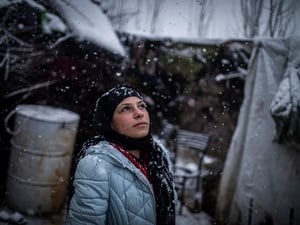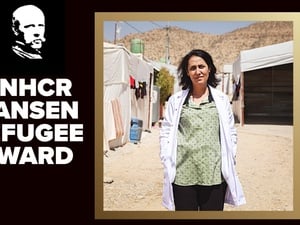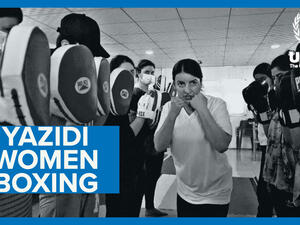Iraq: Relief supplies flown in, first shelter programme begun
Iraq: Relief supplies flown in, first shelter programme begun
A UN C-130 Hercules cargo plane is today flying three prefabricated warehouses and 90 tents from UNHCR stockpile in Iskenderun, Turkey, to Basra, in southern Iraq, as we continue to build up relief supplies to assist returning Iraqi refugees and displaced persons going back to their homes.
In the last week, we have sent 50 truckloads of aid from our regional stockpile in Jordan into Baghdad and Basra. Already more than 2,800 tents, 55,000 blankets, 15,000 mattresses, 10,800 tarpaulins, 12,000 jerry cans, lanterns, kitchen sets and seven metric tons of soap have been delivered to our two main Iraqi depots.
Earlier this year, UNHCR had stored emergency relief supplies in countries bordering Iraq due to fears that large numbers of refugees might flee. We are now moving the goods into Iraq, as small numbers of Iraqi exiles start returning home. Several smaller deliveries took place in May and June, as we aided displaced Palestinian refugees in Baghdad and returning Iraqis in the north of the country.
Basra and Umm Qasr received 244 refugees returning from Saudi Arabia's Rafha camp a week ago, the first UN repatriation convoy since the Saddam Hussein government fell. A second convoy is expected in Basra early next week, carrying a similar number of refugees who have been clamouring to go back since last April. In all, more than 3,600 refugees are expected to leave Rafha this year.
Returns from Iran are expected to start later in August, all refugees anxious to return and who refuse to wait until security has improved. We have already given Iraq's Coalition Provisional Authority (CPA) a list of 106 refugees who would like to return from Ashrafi camp, Iran's largest camp, hosting more than 11,000 Iraqis.
Meanwhile, in Northern Iraq, we have begun a shelter programme to help displaced people who have returned to their original villages to rebuild houses destroyed during the Saddam Hussein government's campaign against Iraqi Kurds.
The construction of 70 houses for around 500 people in Makhmour district's Dengawa and Tela Mater villages is part of UNHCR's project to stabilize communities where returns of internally displaced people, or IDPs, have taken place. The residents of the two villages outside the northern Iraq administrative capital of Erbil were among hundreds of thousands of Iraqis forced from their homes by conflicts and government ethnic cleansing campaigns.
Following the collapse of the previous government, the villagers of Dengawa and Tela Mater returned to their properties under an arrangement mediated by the CPA in which Arabs received 50 percent of this year's crop of wheat and barley. The Arabs had occupied the two villages after the original residents had been thrown out in 1987.
In June, UNHCR distributed tents, blankets, lamps, stoves and kitchen sets to the returnees in the two villages. Last week, we began trucking cement and concrete blocks to the areas. Under supervision by local authorities, the returnees have begun laying the foundations of their houses. We are also providing to them gravel, sand and door and window frames.
UNHCR has also identified several other villages in the Dohuk and Kirkuk regions which would receive assistance in the rebuilding of shelters and other basic needs. However, there are areas where we believe returns cannot take place now because of property disputes, the absence of basic infrastructure and in some places the presence of unexploded ordnance. UNHCR has joined an appeal by the coalition and local authorities for displaced people to refrain from returning to these areas in the meantime.







